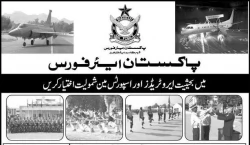Eduvision has conducted a study on 144 students through our seminars at colleges of Islamabad. We have come across some interesting findings through our survey conducted on these students
Amongst these students 80 were from science fields (Pre-Engineering, Pre-Medical, and Computer Science). While the rest were commerce students. Overall, 62.5% of students from different colleges wish to pursue STEM careers in their future. Besides these, 22% of them have shown an interest in pursuing their own business, while 15.28% of the remaining students have shown interest in other careers most of which are in the forces.
Top 5 Career Choices of Students in Pakistan
Eduvision conducted a survey across multiple secondary and higher secondary students in Pakistan. Using this survey, we have established top 5 career choices amongst students.
Fields of Computer Science
A sharp increase in the preference of computer science has been observed compared to previous trends. 42.3% of the students from the science fields, said they wanted to establish a career in computer science or the fields related to it. Artificial intelligence, cyber security, and software development remained amongst their top choices. A number of students who picked engineering as their first choice also showed interest in computer science related fields.
Fields of Engineering
31% of the science students were interested in Engineering. Most of these students expressed interest in software engineering. Others included aeronautical and mechanical engineering. Besides this a large number of engineering students also showed interest in computer science careers, expressing their intent to switch from engineering to computer sciences.
An interesting finding amongst many of these students was that they simply said they wanted to pursue ‘Engineering’ as a career. This reflects the prevalent lack of awareness regarding engineering as a diverse and large field, with variable career opportunities, all requiring distinctive abilities.
Fields of Medical sciences
Amongst the students who chose science majors, 26% indicated their interest in medical studies. The first preference indicated by 73% of these students was MBBS. Besides this, a significant number of students showed interest in dentistry and pharmacy. A less common yet significant number also mentioned nursing amongst their 3rd career preferences.
Personal Business
60% of the commerce background students showed interest in business as their first choice. Their secondary and tertiary choices included careers in chartered accountancy and banking.
This is also a comparatively new finding, compared to those from our surveys five years ago. In 2024, we have observed that many students have changed their career outlook from that of doing a job, to that of stating their own business.
Military and CSS
22% of the total students showed interest in different other fields. Most of them have placed military and CSS in their top career choices. In fact, 15% of the students who chose STEM professions, have also mentioned the military (especially air force) and CSS amongst their third or second career choice.
Factors that Influence Students Career Preferences
Here are the most common influences on their career choices that students have reported,
Family and Parental Influence
A huge number of Pakistani students still prefer careers that their parents want them to. Most parents want their children to become doctors and engineers. Another common preference is also of CSS officers. Such parental preferences arise due to the perceptions of prestige and job security associated with such professions.
Besides parents, students also tend to take inspiration from the careers of their relatives or family friends. Many students who wish to establish careers in the government sector, or in high paying fields like chartered accountancy are usually influenced by successful figures around them, who work in these professions.
Perception of Job Security
In Pakistan, students dream of jobs that are secure. This means that they wish to get into professions where they can get the maximum employment benefits, a respectable salary, and preferably retirement benefits also.
It’s true that many people want to join the military and civil services out of their patriotism and passion to impact the society positively. But one of the major reasons is also that students are making such choices on the basis of traditional perceptions of these careers, and the fear of being financially insecure in the current economic plight of the country.
Earning Potential in a Career
Careers in engineering, computer sciences, and medical sciences provide a great room to make money. These are considered as professions that have a high scope in Pakistan, as well as internationally. Usually, they also provide opportunities to earn considerably well since the very beginning. As you grow in these fields, you can expect to be earning in millions or more per year.
Prestige Associated with a Career
Many students prefer careers that sound lucrative and prestigious. In Pakistan, the most popular ones among these are the civil servants and military officers. Many students wish to get into these fields out of their desire for respect, prestige, and the government benefits associated with such professions.
Peer Pressure
High schoolers also have a great influence on the lives of each other. In that age, students are sometimes too occupied with their friends and fellows, to sit back and see what they actually want to do. Most of them end up trying to do things that others around them are doing. This happens because of their fear of separation, and anxiety of stepping into a completely new environment all by themselves. Resultantly, many of them find refuge in doing what their peers do.
Impacts of Students Career Preferences
The career preferences of students have slightly improved compared to the past. However, some of the major consequences of these choices still remain common in Pakistan. Such choices have multiple impacts on an individual as well as collective level. Additionally, their interconnected nature presents a problem, that needs to be addressed for the national progress of Pakistan.
Impact of Career Choice on Personal Life
A very large sum of students appear in various entry tests, and competitive examinations each year. As the number increases, the pass percentage in these tests declines. Those who remain unable to pursue higher education in these fields as they are unable to clear the entrance exams, and those who give exams for services but remain unsuccessful, feel lost in today’s uncertain economic situation.
Such students are more likely to pick shortcuts (diplomas or certifications) in order to get into their desired fields. Otherwise, they end up doing other degrees, without understanding their scope and relevance to personal aptitude and skills.
When career choices are made in such a way, many people remain unemployed and unable to find the right jobs where they could fit. In this cycle, they do not analyze their personality and skills, due to which employers do not hire them. (Quoteresearch regarding employers quoting that students lack essential skills).
Impact of Career Choice on Job Market
Personal impacts, can prove drastic, while they translate into collective effects. The concentration of career choices leads to the saturation of students and professionals who are looking for the same kind of jobs. Even, if they can not find those jobs, their ability to navigate newer professions is meagre.
Moreover, students prefer popular fields over the ones they might be good at. This leads to lack of innovation and expansion in the existing job markets. The best example for this would be computer sciences. Large sums of students pursue computer science. Due to the high difficulty level, many struggle to even graduate. While in the market, less of them try to innovate new things or be creative. This is because computer science was not their actual skill set. They chose it because it’s a trending career.
Career choices, lead to the development of job market. In Pakistan, saturation in a few popular careers leads to the underdevelopment of numerous job sectors, and businesses.
Impact of Career Choice on Economy
A country’s job market directly impacts its economy. With a small job market, unemployment is commonplace!
A country’s GDP is dependent upon the revenue it generates through its products and services. These products and services do not increase in number and quality because the job market lacks the skills and initiatives to generate newer businesses, or products. Resultantly, the entire economy remains unable to expand. Rather it plummets due to the increasing load of unemployed and retired individuals that the government tries to make up for in one way or another.
The Real Problem with Career Preferences
Career choices impact the entire country deeply. But what is the main problem with such choices?
The real issue with career choices of Pakistani students is their lack of awareness regarding their aptitude, strengths, and weaknesses. They prefer popular or prestigious careers, over those where they can actually excel. This is why many employers complain about the lack of creativity or skill in different graduates. And this is also a major factor that hinders innovation in Pakistan.
Aptitude means one’s innate ability to excel at a particular set of tasks. Aptitude decides the right career for the right person. Pakistani students need to be equipped with tools to help them understand the diverse range of professions they can adopt, according to their own aptitude.
One’s aptitude is a combination of their values, what they enjoy doing, their qualities, and also what they may not be excelling at. Once a student has an idea of their aptitude, he/she can see the demands of the study and career path they wish to think. In this way aptitudes can be matched with career requirements, resulting in informed decisions, and career success of Pakistan’s future leaders.
Eduvision has pioneered career planning in Pakistan, through our scientifically designed career planning assessment and counselling sessions for students across Pakistan. Your future depends upon your choices today. If you are confused regarding your educational and career decisions, contact us now!




.webp)

.webp)

.webp)
.webp)


